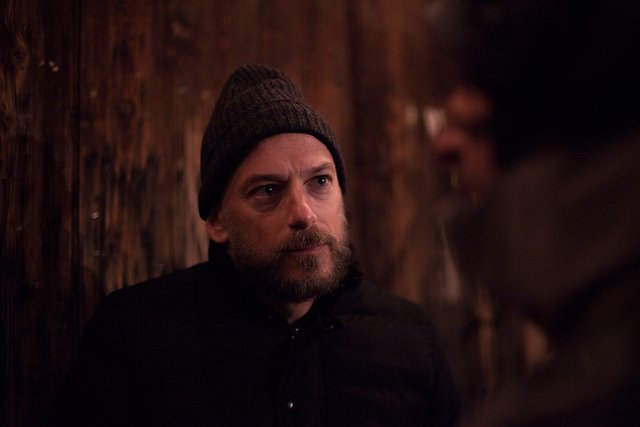Film Review: Deep In the Wood

Deep in the Wood (2015), directed by Stefano Lodovichi; starring Filippo Nigro, Camilla Filippi, Giovanni Vetorazzo, and Stefano Pietro Detassis.
Note: Mild spoiler ahead.
This greatly underrated Italian film demonstrates how a talented director can make a very creepy and atmospheric film with clever camerawork and just a few simple sets and props. This not-quite-a-horror, not-quite a family drama film holds the audience’s attention with misdirection, hinting at a monstrous supernatural presence that keeps threatening to materialize; in the end, however, the real monsters turn out to be all too human.
Set in a small village in the Dolomites mountains of Northern Italy (part of the Italian Alps), Deep in the Wood refreshingly shows viewers a side of Italian culture that isn’t often depicted onscreen. Although everyone speaks Italian, it's a culture that seems more Germanic than Latinate, with lots of wooden challets and beer pubs proliferating.
The villagers are tough, flinty mountaineers who, despite the presence of cell phones and SUVs, don’t seem to live much differently than the way their ancestors did for centuries. Villagers Linda and Manuel (Filippi and Nigro) are a young couple with a little boy of four, Tommi. They live with Linda’s father, Pietro (Vetorazzo), on the edge of a deep, dark forest (the film features excellent, ominous footage of the mountains, the village and the forest.) Linda, Manuel and Pietro at first seem to have a simple but happy life, until one evening in late December, when they attend their village’s annual Krampus festival, where villagers dress up as hairy, horned Krampus figures and rampage drunkenly through the town. They take Tommi with them, but he gets separated from a drunken Manuel and lurches deep into the forest. The last we see of Tommi in these opening scenes is the little boy stumbling upon a mysterious cabin in the woods, which is aglow with an orange light.
A search party is formed by Manuel to look for Tommi, but he is never found. Then a quick montage of news footage and other scenes tell the story and of the succeeding five years: Manuel is charged with killing the little boy, but is eventually released for lack of evidence. Linda attempts suicide, but survives. The couple continue living together, but sleep in separate rooms. Manuel is treated coldly and with suspicion by their neighbors.
This ends when one day, the local police find a homeless child who looks like Tommi and is the same age as he would have been five years later. They send hair samples to a DNA lab to be matched against some old clips of Tommi’s and they match. The boy is released to Linda and Manuel, but things quickly go wrong. The older version of Tommi lashes out violently at those who hurt or annoy him; he kills the family dog for barking too loud at night and attacks an obnoxious reporter who tries to Interview him.
Linda does not believe that the boy is her son, and grandfather Pietro believes that he’s not human, “a devil.” Only Manuel cares for the boy and tries to establish a fatherly relationship with him. The “devil” theme is cleverly reinforced by the creepy, Satanic-looking Krampus dolls that pop up casually in corners and on shelves throughout many of the film’s scenes.(In Middle European folklore, Krampus is a demonic goat creature who punishes naughty children during the Christmas season.)
Meanwhile, through flashbacks, bits and pieces of a back story start to appear. Linda has been having an on-again, off-again affair with Hannes (Stefano Pietro Detassis), the same policeman who sent Tommi's hair samples away for testing. The local pub owner and his girlfriend are hiding some sort of dark secret connected with the owner’s mentally handicapped brother, Dimitri, who is terrified of Tommi. Grandpa Pietro also seems to be sitting on a secret of his own.
Things come to ahead when Manuel confronts Dimitri (Luca Filippi) and learns the truth about what really happened the night Tommi disappeared in the woods. Or is it really the truth after all? This film has an unexpected double twist at the end that few viewers will see coming, although clues were planted beforehand, so the director plays fair.
Nigro as Manuel carries most of the film, playing a simple, decent, working-class bro who likes his pint at the pub, but who is quietly suffering emotional torment from losing his son for five years and then being treated as a child murderer by his friends and neighbors. All of which is remarkably reflected in his pained, startlingly blue eyes. In one heartbreaking scene, he hoists the returned Tommi up, Lion King style, and walks through the village yelling “see, my son isn’t dead, I didn’t kill him” at the top of his lungs.
Filippi as Linda is more low key, but does well with a difficult role, and she has a memorably scary scene where she is terrorized by a very disturbing Krampus vision in her bedroom.
8/10, currently streaming on Amazon. For people who hate foreign films and subtitles, this film isn't very hard to follow. Turn on closed captioning for the subtitles as they aren't embedded in the film
Nice review! I noticed it was particularly undervalued. ;^]
Keep up the great work!
Hello @janenightshade, thank you for sharing this creative work! We just stopped by to say that you've been upvoted by the @creativecrypto magazine. The Creative Crypto is all about art on the blockchain and learning from creatives like you. Looking forward to crossing paths again soon. Steem on!
I upvoted your post.
Keep steeming for a better tomorrow.
@Acknowledgement - God Bless
Posted using https://Steeming.com condenser site.
Thanks! I followed.